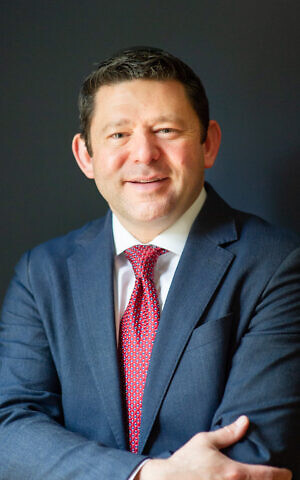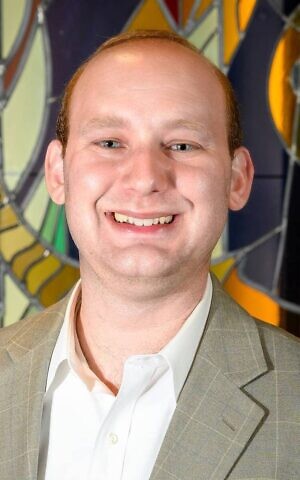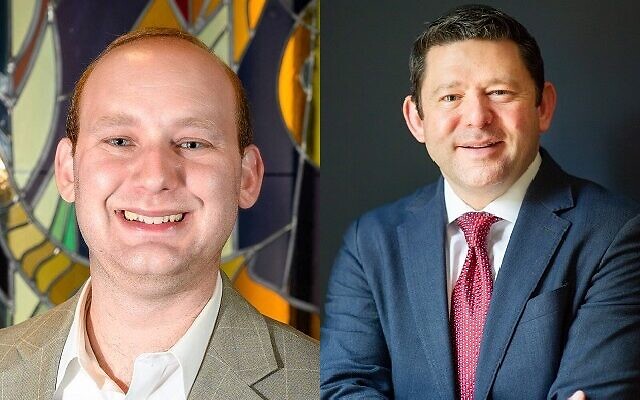Anti-Semitic Dialogue Continues With Cobb Schools
Private meetings are part of two-pronged diplomacy efforts.
Sometimes something good can result from something bad, suggested a couple of Cobb County rabbis. They were referring to some of the consequences following the unsettling incidents of anti-Semitic graffiti found in Cobb County schools during the High Holy Days.
Rabbi Larry Sernovitz of Temple Kol Emeth pointed to the old saying, “when it’s bad for the Jews, it’s good for the Jews.” Congregation Etz Chaim Rabbi Daniel Dorsch said he believes the subsequent ongoing, compassionate communication the Jewish community has had with school district leaders is a positive upshot of the attacks that provoked outrage and fear among students, parents and teachers.
A meeting held at Etz Chaim on Nov. 2 that enabled dialogue between Cobb teachers and school district leaders was “really terrific” Dorsch said. “Members of the school district are supportive of the Jewish community. Everyone felt heard.” About two dozen teachers attended the short program scheduled to be held again on Nov. 8 at Temple Kol Emeth, which is also in Cobb County.

Sernovitz called it a “shehecheyanu moment,” emphasizing that it is a first. “From a faith perspective, there is a lot of divine intervention,” he said. “Now we can actually have conversations we have needed to have for decades.”
According to Dorsch, the major issue is the need for educators to be sensitive to both Jewish students and faculty.
It was an apparently insensitive reaction to the graffiti on the part of the Cobb County Board of Education that particularly riled the Jewish community. Initially, the school board, as well as several principals, refrained from identifying the anti-Semitic significance of the graffiti, which included swastikas, calling it “hate speech.”
When the school board later passed a resolution that called out anti-Semitism, many in the community were unsatisfied, basically saying that the resolution contained empty words.
The resolution stated: “It is resolved that the Cobb County School Board, the Superintendent and all employees of the Cobb County School District hereby stand steadfast with all citizens of Cobb County against antisemitism, racism and hatred in all its forms and continues our commitment to stand up for justice, inclusivity, and support civil rights for all. To maintain welcoming and inclusive school communities, the Board reaffirms its continued commitment to take proactive steps to address antisemitism, racism and all other forms of hate in Cobb County School District.”
The Southeast office of the Anti-Defamation League reacted by stating that “the Cobb County Schools Board of Education’s resolution in response to recent antisemitic incidents is a good first step, but unless followed by specific actions, it’s an empty gesture. Hate in all forms must be responded to with action and education, not empty value statements. … We can’t support this as an adequate response without a commitment to a specific plan to use education to combat antisemitism and prevent future acts of hate in Cobb County schools. We look forward to seeing the county’s action plan.”
Dorsch said that he was “happy” with the resolution, although he wished it had been passed unanimously. “The fact that they passed it, considering how polarized they are,” was significant. He also pointed out that school board meetings all over the country have become a target for community in-fighting.
Dorsch said that the public response to the resolution, juxtaposed with the “wonderful meetings behind the scenes,” was part of a “two-pronged approach to this diplomacy.”
In the more private meetings held between Cobb rabbis, Jewish community leaders and Cobb school district members, one of the hottest issues was the teacher holiday absence policy. “We were challenged to find out if other school districts in Georgia had a policy” that allows Jewish teachers to be absent during Jewish holidays without using their personal days, said Dorsch.

What Jewish leaders discovered is that Gwinnett County, one of the fastest growing counties in the country, has had such a policy for 25 years. That policy states: “Leave for religious holidays may be granted to employees in Board-approved positions. Leave for religious holidays may not exceed three days per fiscal year. The leave should be made up by the employee at a time mutually agreed upon by the employee and the principal or program manager. Requests for religious leave must be submitted 20 days prior to the requested leave date. There are times when religious observances occur close to the beginning of the school year, making it impossible for employees to give 20 days notice. Whenever this situation exists, less than 20 days notice is acceptable. Notice should be provided at the beginning of the school year.”
Dorsch sees particular progress in the two sides’ understanding of each other. The Jewish community has learned that “75 percent of the school principals in Cobb County have been on the job for under five years. A lot of these people just don’t know” about the Jewish holidays. That has led to teachers scheduling tests or extra homework on or right after holidays, not understanding that a student who has fasted for Yom Kippur might not be prepared to take a test the next day.
“Teachers would make students feel bad,” he said. “Now they are being provided with more empathetic language. The only appropriate response to a student is, ‘we will miss you and will catch you up upon your return.’”
Looking at the bright side, Dorsch said the Jewish community and the school district have now “started the conversation with how to move the needle forward.”
- Jan Jaben-Eilon
- News
- Local
- Anti-Defamation League Southeast
- Cobb County
- jewish community
- Rabbi Larry Sernovitz
- Temple Kol Emeth
- congregation etz chaim
- Rabbi Daniel Dorsch
- jewish students
- Jewish faculty
- Cobb County Board of Education
- anti-Semitic
- Graffiti
- Racism
- hatred
- Gwinnett County
- religious leave
- religious observances
- Jewish Holidays
- Cobb County School Board
- Cobb County School District
- Justice
- Inclusivity
- Civil Rights
- Education
- Jewish community leaders
- Cobb County Rabbis
- High Holy Days




comments